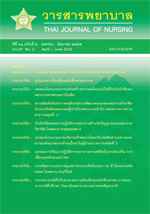ปัจจัยที่มีผลต่อการปฏิบัติการพยาบาลด้านจิตวิญญาณของพยาบาลวิชาชีพ โรงพยาบาลชุมชน เขต 4
Main Article Content
Abstract
ผลการวิจัยพบว่า ความรู้ทางการพยาบาลด้าน จิตวิญญาณอยู่ในระดับมาก เจตคติต่อการพยาบาล ด้านจิตวิญญาณอยู่ในระดับสูง ภาระงาน และการปฏิบัติ การพยาบาลด้านจิตวิญญาณอยู่ในระดับปานกลาง ความรู้ทางการพยาบาลด้านจิตวิญญาณ ไม่มีความ สัมพันธ์กับการปฏิบัติการพยาบาลด้านจิตวิญญาณ เจตคติต่อการพยาบาลด้านจิตวิญญาณ และภาระงาน มีความสัมพันธ์ทางบวกกับการปฏิบัติการ พยาบาลด้าน จิตวิญญาณ อย่างมีนัยสำคัญทางสถิติ ที่ระดับ .05 และ เจตคติต่อการพยาบาลด้านจิตวิญญาณ และภาระงาน สามารถอธิบายความแปรปรวนของการปฏิบัติการพยาบาล ด้านจิตวิญญาณได้ ร้อยละ 24.6 อย่างมีนัยสำคัญ ทางสถิติ ที่ระดับ .01
Factors affecting practice of spiritual care given by professional nurses at community hospitals, region 4.
Yenbamrung, C., Cheevakasemsook, A., Tongprateep, T., & Kusolvisitkul, W.
The purposes of this descriptive research were to study knowledge, attitude, workload, and spiritual care practices of professional nurses, and the relationships among them and to identify the predictors of spiritual care practices of professional nurses at community hospitals, Region 4. The sample of 241 professional nurses at community hospitals, Region 4, were selected by a systematic sampling technique. The research tools were questionnaires on demographic data, knowledge, attitude, workload, and practice of spiritual care. Data were analyzed for frequency, percentage, mean, standard deviation, Pearson correlation coefficient, and stepwise multiple regression analysis.
The results were as follows. 1) The professional nurses had knowledge of spiritual care and attitude to spiritual care at the high level but the workload and practice of spiritual care were at the moderate level. 2) Knowledge of spiritual care did not correlate to practice of spiritual care but attitude to spiritual care and workload correlated positively and significantly to practice of spiritual care at p < .05. 3) Attitude of spiritual care and workload could explain the variance of practice of spiritual care for 24.6 percents.


